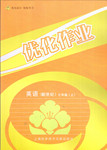题目内容
Attracted by the great poet抯 masterpiece, Alex sat reading by the seaside, _______ to the worlD.
- A.Losing
- B.Having lost
- C.Lost
- D.To lose
本题测试的是过去分词的使用能力。这个lost to the world词组是不少考生没有见过的,原因是他们缺少足够数量的语篇阅读与聆听的经验。听力与阅读是考生输入语言信息的源泉,只有多输入才能多输出,才能在语句的上下文的基础上,确定上文lost to the world的意义。当然,如果考生具备较强的想象力,也能够顺利完成此题。

 培优三好生系列答案
培优三好生系列答案 优化作业上海科技文献出版社系列答案
优化作业上海科技文献出版社系列答案A painting by Chinese artist Qi Baishi set a record for modern art and calligraphy (书法) on the mainland when it sold for 425.5 million yuan at an auction (拍卖) on May 22. The sale was a milestone (里程碑) in the auction of modern and contemporary artworks.
The price meant its value had risen more than 2,000 per cent in six years . The work , Eagle standing on pine tree with four-character coupleti(对联), measures about 2.6 metres by 1 metre . It was the second highest price paid for an artwork on the mainland . A Song dynasty work by Huang Tingjian was sold for 436.8 million yuan in 2010 . Qi’s painting was finished in 1946 when Qi was 86 , and was his largest work . With a starting price of 88 million yuan , it attracted nearly 50 bids(出价)in half an hour . Shanghai businessman Liu Yiqian said that the work had belonged to him and had cost less than 20 million yuan in 2005 . The auction company said the work was brought back to the mainland after being bought from a private owner in San Francisco six years ago .
China ranked first in global art sales last year , ahead of the United States and Britain . Four Chinese artists were among the top 10 in worldwide sales : Qi Baishi , Zhang Daqian , Xu Beihong and Fu Baoshi . Qi’s works ranked second in sales to Pablo Picasso’s last year . Qi was born into a peasant family in Hunan in 1864 . He taught himself to paint and focused on nature including plants , insects , birds and fish . He is mostly well-known for his paintings of shrimps . In 1953 , he was elected president of the Association of Chinese Artists . He died in Beijing in 1957 .
1.What’s the best title of the text ?
|
A.Qi Baishi’s Painting Was Discovered . |
|
B.Qi Baishi’s Painting Was Brought Back . |
|
C.Qi Baishi’s Painting Sets an Auction Record . |
|
D.The Value of Qi Baishi’s Paintings Is on the Increase . |
2.Whose artwork sold for the highest price on the mainland ?
|
A.Qi Baishi’s . |
B.Huang Tingjian’s . |
|
C.Xu Beihong’s . |
D.Zhang Daqian’s . |
3.The auction price of Qi’s painting was million yuan higher than the starting price in the auction .
|
A.337.5 . |
B.348.8 . |
C.50 . |
D.11.3 . |
4.Which of the following is TRUE ?
|
A.Qi finished the painting when he was young . |
|
B.The painting was once stolen by an American . |
|
C.The owner of this painting Liu Yiqian gained a lot of money . |
|
D.Pablo Picasso’s works ranked second in sales to Qi’s last year . |
5. The text is most probably taken from a .
|
A.computer book |
B.library guide |
|
C.technology magazine |
D.newspaper report |